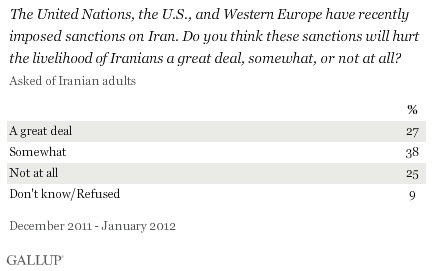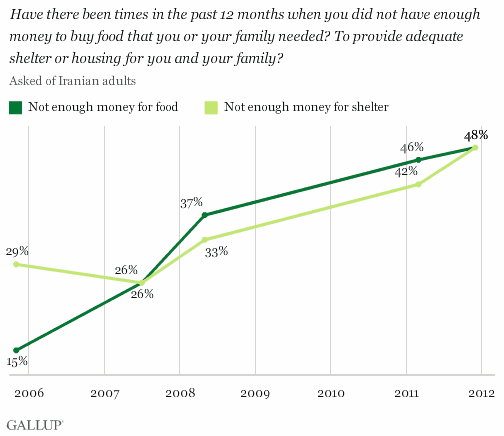WASHINGTON, D.C. -- As the U.S. orders more economic sanctions against Iran, a new Gallup poll finds nearly two-thirds of Iranians think recent sanctions that the United Nations, the U.S., and Western Europe have already imposed will hurt the livelihoods of the country's residents "a great deal" (27%) or "somewhat" (38%).

The European Union on Jan. 23 banned Iranian oil exports and froze the assets of Iran's central bank in the EU to pressure the government over its suspected nuclear weapons program. That move followed the Dec. 31 signing of a U.S. law imposing new sanctions targeting Iran's central bank. President Barack Obama went a step further Sunday, signing an executive order that freezes Iranian state assets in the U.S.
In the face of mounting financial pressure, the value of the Iranian rial has dropped sharply in recent weeks, and prices of food, consumer goods, and utilities have spiraled. Almost half of Iranians (48%) now say there were times in the past year when they did not have enough money to buy food their families needed, more than tripling the 15% who said so in 2005. Forty-eight percent also currently report there were times in the past year when they didn't have enough money to provide adequate housing for themselves or their families, up from 29% in 2005.

These economic ramifications may also be affecting Iranians' daily mood. A majority (55%) say they experienced worry for much of the previous day, up from 38% when Gallup last surveyed in Iran in February-March 2011. Similarly, almost half of Iranians (47%) say they felt angry during a lot of the previous day, compared with slightly more than one-third (35%) a year ago.

Implications
In pursuing tighter economic sanctions against Iran, U.S. officials point to evidence that they have slowed the progress of Tehran's suspected nuclear program. However, the effect of sanctions on day-to-day life in Iran is also a major concern for U.S. leaders, who seek to engage with ordinary Iranians even as they attempt to make things more difficult for the country's leaders. In addition to the possible humanitarian consequences of economic sanctions, experts cite the possibility that any hardship they create may intensify anti-Western sentiment in Iran and strengthen support for the current regime.
Iranians' favorability toward Western leaders remains low. Eight percent say they approve of U.S. leadership, 7% approve of U.K. leadership, and 13% approve of German leadership, results similar to
those found in early 2011. Such figures demonstrate that Iranians' protests against their own leadership should not be construed as support for the West -- and that Western leaders need to monitor the unintended effects sanctions may have on Iranians' lives.



